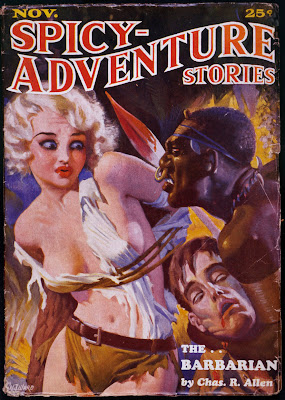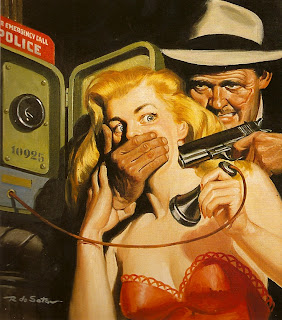Last week the Society of Illustrators opened a wonderful exhibition of pulp magazine covers from the 1930s and 40s. The show includes nearly 90 paintings of scantily clad damsels in distress, hooded fiends with elaborate torture devices, and futuristic space heroes. This is probably the most emotionally uncomplicated art you will ever find: big, juicy paintings with the open heart (and emotional maturity) of a 14 year old boy.
Some of the paintings, such as this gem by the great Baron Leydenfrost, are executed with astonishing skill:
But most of these pictures are painted with a technique as vulgar as their content. There was no room for subtle colors and elaborate compositions on a magazine rack crowded with competing pulp magazines.
The girls on these covers always seemed to be in peril, and ripe for rescue by the proper hero.
Young male readers were tantalized by the prospect of what lay beyond those slightly parted dressing gowns or those strategically torn shirts. They pored over these illustrations for clues to what awaited them someday. It's a mark of their innocence that their best plan for winning such favors was by rescuing a girl from space monsters.
If you're looking for a holiday from moral complexity, pulp art may be just the oasis for you. In fact, the owner of this marvelous collection, Robert Lesser, calls it “escape” art. But its simple mindedness is the source of both its joyful strength and its gnawing weakness.
Which brings me to my question of the week: Is it okay to like pulp art?
Let's put aside that this stuff is politicallly incorrect. My question is focused solely on artistic merit. Is this stuff anything more than “chewing gum for the eyes”? What are we to make of art that is not particularly well painted and does not challenge us mentally or emotionally, that raises no questions and doesn't expand our vision, but is undeniably likable for nostalgic reasons?
Let's put aside that this stuff is politicallly incorrect. My question is focused solely on artistic merit. Is this stuff anything more than “chewing gum for the eyes”? What are we to make of art that is not particularly well painted and does not challenge us mentally or emotionally, that raises no questions and doesn't expand our vision, but is undeniably likable for nostalgic reasons?
Beryl Markham cautioned us about the temptation to look over our shoulder at simpler, bygone days:
Never turn back and never believe that an hour you remember is a better hour.... Passed years seem safe ones, vanquished ones, while the future lives in a cloud, formidable from a distance. The cloud clears as you enter it. I have learned this, but like everyone I learned it late.
This is a worthy sentiment, but I nevertheless think pulp art is a valid art form. The moral obviousness of these pictures gives them an ethical virility that you won't find in more sophisticated art. They are akin to religious paintings from the age of faith, which left no ambiguity about who was the bad guy, who was the hero, and which blonde needed to be rescued.
The fact that such ethical clarity is an illusion doesn’t mean it isn't art.
The fact that such ethical clarity is an illusion doesn’t mean it isn't art.















